What does TB mean in HARDWARE
TeraByte, commonly abbreviated as TB, is a unit of measurement in computing. TB is generally used to measure the storage capacity or memory size of hard drives, storage devices and computer memory. This unit of measurement is used to denote the amount of data that can be stored in a given device or system and it indicates how much memory or capacity that system has to offer its users. TB is also commonly referred to as terabyte or terabytes as it stands for one trillion Bytes of information or data.

TB meaning in Hardware in Computing
TB mostly used in an acronym Hardware in Category Computing that means TeraByte
Shorthand: TB,
Full Form: TeraByte
For more information of "TeraByte", see the section below.
Meaning
A TeraByte (TB) is equal to 1000 GigaBytes (GB), 1024 GigaBytes (GB), 1 million MegaBytes (MB) and 1 trillion bytes. It can also be considered equivalent to 1000000000000 bytes. Due to this huge number of bytes being made available for use by an individual user, this unit of measurement has become quite popular with computer users who require large amounts of storage space and RAM on their systems in order to make the most out of their machines. Furthermore, hard disks are now being sold with multiple TeraByte capacities in order for individuals who seek large volumes of storage space for their day-to-day computing needs.
Usage
TBs are extensively used when referring to the size or capacity of hard drives, optical media such as CDs and DVDs, flash memory cards, USB drives and other such forms of electronic storage mediums. Moreover, TB measurements are also employed when referring to computer processing speeds which helps understand the efficiency rate at which certain tasks can be accomplished on a device. Therefore, while shopping for an electronic device or any form of hardware component which requires lots or expansive storage capabilities should consider investing into products that offer larger amounts in TeraBytes (or GBs if TB measurements are not available).
Essential Questions and Answers on TeraByte in "COMPUTING»HARDWARE"
How many Terabytes equal one Petabyte?
One petabyte is equivalent to 1000 terabytes.
How much data can a 1 TB hard drive store?
A 1 terabyte hard drive has the capacity to store approximately 8,000 hours of music, or 750,000 photos, or 3200 movies.
Does a Terabyte mean anything in terms of speed?
No, as a unit of measurement it does not measure speed. The terabyte measures the amount of space on storage devices such as hard drives and USB flash drives.
What is faster - a Terabyte or an SSD?
While the size (measured in terabytes) may be different between an SSD and a traditional hard drive, the performance in terms of speed will likely be faster with an SSD due to its lack of mechanical parts.
Can I erase my TeraByte Hard Disk Drives (HDDs)?
Yes you can erase your TeraByte HDDs by formatting them using disk utility software such as Disk Utility in Mac OS X or Disk Management in Windows 10.
Is it better to buy multiple smaller capacity drives instead of single larger ones?
It depends on the usage and cost-benefit analysis done for each case. Typically larger capacity drives are more economical but may be prone to bigger failure if they get corrupted as all data resides on single HDD and there is no redundancy factor involved here. Buying multiple small capacity hdds could provide redundant storage but at higher cost and complex management.
Is it safe to keep important data on a TeraByte Hard Drive?
Keeping data on any digital medium is subject to risks but taking necessary preventive measures including regular backing up important files can reduce the risk substantially. Therefore yes it's relatively safe to keep important data on large-capacity HDDs like those available in terabytes however regular testing and backup regimen need to be followed as well.
Are 2TB HDDs reliable enough for professional use?
Yes, two TeraByte (2TB) Hard Disk Drives (HDDs) are reliable enough for professional use provided that high quality components are used during manufacturing process along with proper testing before shipping out units from factories for end user consumption.
What is RAID technology and what benefit does it offer when used with several TBs?
RAID stands for Redundant Array of Independent Disks which allows combining multiple storage disks into one unit offering benefits like improved data integrity, increased read/write speed and fault-tolerance among others when used with several terabytes worth of storage disks in various configurations such as Raid 0 (striping), Raid 1 (mirroring) & Raid 5 (striped blocks).
Final Words:
In conclusion, TeraByte is a unit commonly used in computing for measuring large volumes and amounts which can be stored into an electronic device such as a hard drive and RAM modules etceteras. With several manufacturers now offering varying sizes ranging from gigabytes up to terabytes within their respective product ranges users do not have any difficulties finding solutions that best fit within their budget limits while still providing them with enough room for their future applications without having necessity upgrade their hardware components down the line due to inadequate memory issues they may have been facing previously.
TB also stands for: |
|
| All stands for TB |
